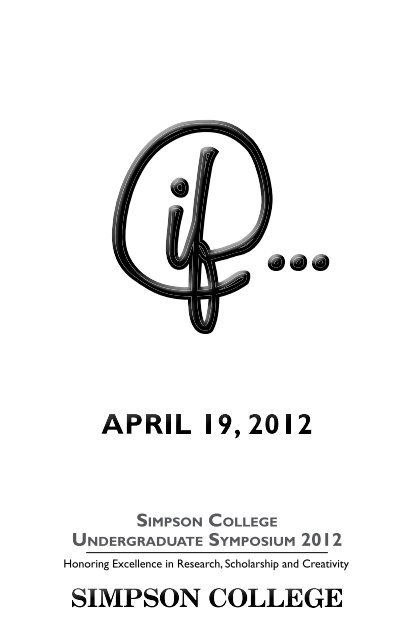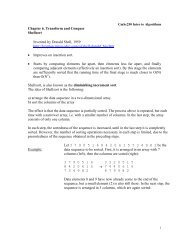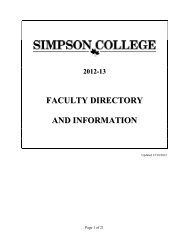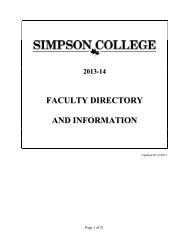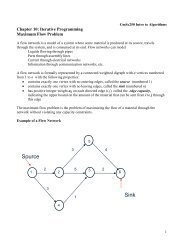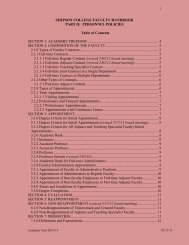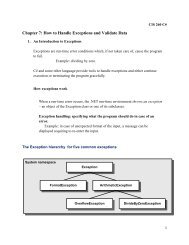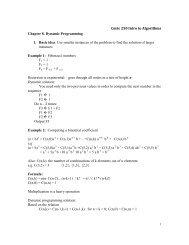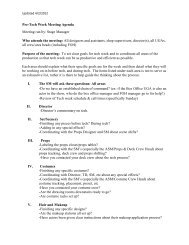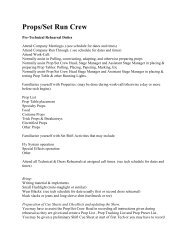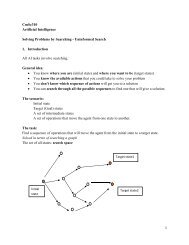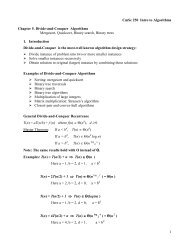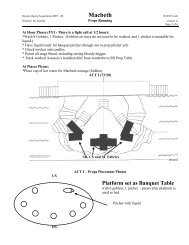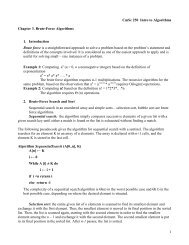2012 Undergraduate Research Symposium - Simpson College
2012 Undergraduate Research Symposium - Simpson College
2012 Undergraduate Research Symposium - Simpson College
You also want an ePaper? Increase the reach of your titles
YUMPU automatically turns print PDFs into web optimized ePapers that Google loves.
<strong>Simpson</strong> <strong>College</strong><br />
<strong>Undergraduate</strong> <strong>Symposium</strong> <strong>2012</strong><br />
Honoring Excellence in <strong>Research</strong>, Scholarship and Creativity
It is my pleasure to welcome you to <strong>Simpson</strong>’s third annual<br />
<strong>Undergraduate</strong> <strong>Symposium</strong>!<br />
This year has been a great one for undergraduate research at <strong>Simpson</strong><br />
<strong>College</strong>! Today you will have an opportunity to participate in what<br />
is becoming one of the highlights of our academic year. Many of the<br />
students you will meet today have already presented their work at<br />
professional conferences. Others will continue their work in graduate<br />
schools this fall. Some will spend the summer working at research labs<br />
across the country. The creativity and talent of <strong>Simpson</strong> students never<br />
ceases to impress me. Partner great students with dedicated faculty<br />
and the results are similarly impressive! Students applying what they<br />
have learned is an important marker for a <strong>Simpson</strong> <strong>College</strong> education.<br />
Thank you for sharing your day with us.<br />
Sincerely,<br />
Steven J. Griffith<br />
Senior Vice President and Academic Dean<br />
2
Table of contents |<br />
Overview................................................................................................................................... 4<br />
Keynote Speaker...................................................................................................................... 5<br />
Schedule of Events................................................................................................................... 6<br />
Oral Presentation, Panel, and Performance Abstracts..................................................... 9<br />
Poster Sessions....................................................................................................................... 18<br />
Thank you................................................................................................................................ 20<br />
Feedback Form....................................................................................................................... 21<br />
3
| SYMPOSIUM OVERVIEW<br />
<strong>Undergraduate</strong> <strong>Symposium</strong> <strong>2012</strong><br />
Honoring Excellence in <strong>Research</strong>, Scholarship and Creativity<br />
Morning Schedule:<br />
8:00-9:00 AM<br />
Campus-Wide Breakfast. Atrium, Carver Hall<br />
9:00-9:45 AM<br />
Keynote Address. Lekberg Hall, Amy Robertson Music Center<br />
10:00-10:50 AM<br />
Concurrent Oral Presentations and Performances I<br />
11AM-12:30PM<br />
Senior Art Exhibit & Reception. Farnham Gallery. Mary Berry Hall<br />
Afternoon Schedule:<br />
12:30-2:00 PM<br />
Honors Convocation. Smith Chapel<br />
2:15-3:05 PM<br />
Concurrent Oral Presentations and Performances II<br />
3:15-4:15 PM<br />
Poster Session and Hors d’oeuvre Reception. Pote Theater Lobby, Blank<br />
Performing Arts Center (BPAC)<br />
4:15-4:30 PM<br />
Awards and Remarks. Pote Theater, BPAC<br />
4:30-5:00 PM<br />
Music Performance. Pote Theater, BPAC<br />
4
Keynote Address and Speaker |<br />
9 A.m., lekberg hall<br />
as an undergraduate Bian Li wasn’t<br />
interested in <strong>Research</strong>, Scholarship and Creativity she<br />
wouldn’t have …<br />
… been an <strong>Undergraduate</strong> Writing Fellow of the<br />
University of Iowa’s Writer’s Workshop or a fellow in the John Hawkinson<br />
Honors Finance Program<br />
… conducted award-winning undergraduate research on insect physiology and<br />
ecology in Kenya<br />
… conducted undergraduate research on the impact of women’s microcredit<br />
cooperatives in fighting rural poverty in Kenya<br />
… worked with community-based organizations and women’s agricultural<br />
cooperatives in Ghana<br />
… volunteered as an English teacher to Congolese refugees, and taught Spanish<br />
and Mandarin<br />
… worked as an investment banker overseeing US-China strategic partnerships<br />
and managing transactions for Asia-Pacific cross-border deals<br />
… developed an expertise in food security issues<br />
… become an advocate for the poor and hungry around the world as an<br />
Oxfam Sister on the Planet Ambassador<br />
… been selected to serve as The World Food Prize Foundation Director of<br />
Planning, in which she coordinates many World Food Prize events, and<br />
conducts research, policy analysis, long-term planning, and strategic initiatives<br />
… and all before she was 28.<br />
We invite you to hear her speak about where<br />
intellectual curiosity can take you!<br />
5
| SCHEDULE OF EVENTS<br />
Morning Schedule:<br />
8:00-9:00 AM - Breakfast<br />
Campus-wide Breakfast. Carver Science Building Atrium, main level<br />
All are invited. Presenters must check in to get programs, lanyards, and to<br />
confirm final schedules.<br />
9:00-9:45 A.M.<br />
Keynote Address. Amy Robertson Music Center, Lekberg Hall, main level<br />
Today’s keynote speaker is Bian Li, a graduate of the University of Iowa and<br />
currently Director of Planning at the World Food Prize Institute. She will<br />
be speaking about intellectual curiosity, and where it can lead you.<br />
10:00-10:50 A.M. Concurrent Oral Presentations and Performances 1<br />
Performing the Arts. Amy Robertson Music Building, Madsen Hall, main level;<br />
Moderator: Michael Eckerty<br />
• Molly Burkemper. She Talks to Angels<br />
• Caitlin Dicus. First Year Frolicking<br />
Issues in Community Life. McNeill Hall, Room 110; Moderator: Steve Duffy<br />
• Erin Guzman. “Go and Make Disciples”: Evangelism and Conversion<br />
Focused on Community<br />
• Vanessa Reed. The Cause and Effect of Social Movements in Politics<br />
and Society<br />
• Kraig Thomas. War Disease: A Spatial-Temporal Analysis of Civil War<br />
Interactive Panel Discussion. McNeill Hall, Pioneer Conference, Room111;<br />
Moderator: Maeve Callan<br />
• Nicolas Proctor, Bobby Dennis, JoAnna Freeland, Dustin McNulty,<br />
Emily Stover, Ryan Stumbo, Cody Zaring, Josh Zieman. Reacting to<br />
the Past: Chicago 1968<br />
Joe K. Moody <strong>Research</strong> <strong>Symposium</strong> I. Carver Science Building, Jordan<br />
Lecture Hall, Room 215; Moderator: Lydia Sinapova<br />
• Kathryn Burdock, Sarah Kennedy, Amy Doling. Optimizing the Ames<br />
Test: Measuring the Mutagenicity of Diet Coke<br />
• Phillip Seiwert and Anna Statz. Regional Evaluation of Platte River<br />
Wetland Restoration<br />
• Dana Lain. Oil in Our Oceans<br />
6
Issues in Learning & Policy. Craven Room, Dunn Library, 2nd floor;<br />
Moderator: Lisa Carponelli<br />
• Arron Bodine. Immigration Reform in the United States<br />
• Steffanie Elkin. Websites as Vocabulary Instruction Tools for ELL Students<br />
Issues in Philosophy. Wallace Hall, Room 204; Moderator: Emily Skow<br />
• Kevin Rice. The Practicality of Lived Philosophy<br />
• Allie Walker. Rural Women’s Epistemologies<br />
11:00 A.M.-12:30 P.M.<br />
Honors Lunch for invited guests. Great Hall<br />
Afternoon Schedule:<br />
12:30 P.M.- 2:00 P.M.<br />
Honors Convocation. Smith Chapel<br />
2:15-3:05 P.M. Concurrent Oral Presentations and Performances 1I<br />
Performing the Arts. Amy Robertson Music Center, Lekberg Hall, main level<br />
Moderator: Michael Eckerty<br />
• Antonio Reyes, Jr. Crawling to the Moon and a Suitcase of Poetry<br />
• Kathrin DePue. Joy, Pain, and the Writer’s Craft<br />
Issues in Religion and Law. McNeill Hall, Room 110; Moderator: Steve Duffy<br />
• Madie Fiedler. Severus Snape: A Christ-like Model of Love and Sacrifice<br />
in the Harry Potter Series<br />
• Molly Burkemper. Dangerously Religious<br />
• Tracy Sibbel. Emerging Conflict between the Free Exercise Clause and<br />
Establishment Clause of the First Amendment<br />
Issues in Community Life. McNeill Hall, Pioneer Conference, Room 111;<br />
Moderator: Maeve Callan<br />
• Allie Walker. Holstein and the 1980s Farm Crisis<br />
• Ryan Edwardson. Ethics Derived from Paul’s Use of Conscience in First<br />
Corinthians 8-10<br />
7
Joe K. Moody <strong>Research</strong> <strong>Symposium</strong> II. Carver Science Building, Jordan<br />
Lecture Hall, Room 215; Moderator: Lydia Sinapova<br />
• Zach Huebener and Kylie van Houten. Three Approaches to Solving<br />
the Motif-Finding Problem<br />
• Adam Smith, Joel Gawarecki, Jaris Van Maanen, Linsey Williams. A<br />
Genetic Algorithm for Tile Self-Assembly<br />
• Mike Henry, Heather Malbon, Max Nguyen. The Party Problem<br />
Issues in Forecast Models. Dunn Library, Craven Room, 2nd floor; Moderator:<br />
Lisa Carponelli<br />
• Sam Hohneke. A Model for Predicting the Results of the German<br />
Federal Election and Its Application to the 2013 Contest<br />
• Blaise Mikels. A Data Mining Approach to Developing Stock Market<br />
Forecasting Models<br />
Issues in European History and Politics. Wallace Hall, Room 204;<br />
Moderator: Emily Skow<br />
• Phillip Johnson. Will the European Union Survive?<br />
• Elsen Hoxhalli. Democratization in Post-Communist Europe: the Causes<br />
of Development Differences between the Balkan and Baltic Nations<br />
• Erin Broich. The “Bloody” Tyrant and the “Virgin Queen”: Mary and<br />
Elizabeth Tudor and the Struggle for the Hearts and Souls of England<br />
3:15-4:15 P.M.<br />
Poster Session and Hors d’oeuvre Reception. Pote Theater Lobby, Blank<br />
Performing Arts Center<br />
4:15-4:30 P.M.<br />
Awards and Remarks. Pote Theater, Blank Performing Arts Center<br />
4:30-5:00 P.M.<br />
Music Performance. Pote Theater, Blank Performing Arts Center<br />
<strong>Simpson</strong> <strong>College</strong> Symphonic Band, Michael Eckerty, Director<br />
8
ABSTRACTS |<br />
Oral Presentation, Panel and Performance Abstracts<br />
Arron Bodine. Immigration Reform in the United States. Faculty Sponsor:<br />
Eduardo Magalhães III<br />
This is a comparison paper that looks at current U.S. immigration policies<br />
in relation to policies in other countries around the world including France,<br />
Britain, Italy, and other nations of the European Union. I will also look at what<br />
is being done to reform policies in these regions as a means of meeting the<br />
needs of a changing world. I compare the goals of immigration policies in<br />
these countries and the means by which these goals are met. For example,<br />
in the U.S., the major goal of immigration policies today is to address the<br />
need for family reunification, but now the goal is becoming more of one that<br />
stresses employment policies as the needs of our nation are changing. By<br />
comparing these changing needs in immigration policies in the U.S. To those<br />
around the world, I can better come to a conclusion about where the U.S. is<br />
headed in regards to its decision about how to reform immigration policies. I<br />
believe that because the U.S. is a young nation in comparison to those in the<br />
European Union, it is plausible that we would follow in the steps of nations<br />
that have been around longer and have more experience with the issue. I am<br />
also assuming that change is inevitable and that the change will be coming<br />
within the next 10-20 years as the immigration population in our country is<br />
increasing at a rate of about 500,000 a year.<br />
Erin Broich. The “Bloody” Tyrant and the “Virgin Queen”: Mary and<br />
Elizabeth Tudor and the Struggle for the Hearts and Souls of England.<br />
Faculty Sponsor: Maeve Callan<br />
This presentation discusses how Mary and Elizabeth Tudor used religion<br />
in each of their reigns to create unity among, and enforce control over,<br />
the English people. History has given Mary Tudor a poor reputation while<br />
extolling Elizabeth to an exaggerated degree. A secondary purpose of<br />
the paper is to present both Queens on an even level, based not on the<br />
success or failure of either reign, but solely at the effectiveness of their<br />
policies and ideals. It is the overall goal of the presentation to relate the<br />
complications that a society faced when politics and religion were so<br />
thoroughly intertwined.<br />
Kathryn Burdock and Sarah Kennedy. Optimizing the Ames Test: Measuring<br />
the Mutagenicity of Diet Coke. Faculty Sponsor: Amy Doling<br />
The Ames Test assays for substances with potential mutagenic effects. If<br />
a substance causes mutations it could potentially be a carcinogen, which<br />
is harmful to humans. Thus this test can be regarded as essential when<br />
checking for chemicals that might be considered hazardous for humans.<br />
The Ames Test was conducted on Diet Coke, using multiple strains of S.<br />
Typhimurium (TA98, TA1535, and TA1538 his- auxotrophs). Experiments<br />
were conducted to determine whether different dilutions of Diet Coke<br />
could cause mutations in the S. Typhimurium strains. These mutations would<br />
allow the originally Histidine dependent bacteria to grow in the absence of<br />
Histidine. The results of the experiment could indicate whether or not Diet<br />
Coke is a beverage safe for consumption.<br />
9
Molly R. Burkemper. Dangerously Religious. Faculty Sponsor: John Pauley<br />
Eighty-five percent of the entire world’s population identifies with<br />
some religious group. As a universal phenomenon, religion goes largely<br />
unquestioned, but it is exactly this ubiquity that demands the utmost<br />
attention. Despite the great diversity of specific beliefs, the different<br />
religions, by definition, must follow certain patterns. These patterns<br />
concern a religion’s behavioral and mental influence on its adherents,<br />
which—intended or not—is inherently detrimental. Religion may or may<br />
not be worthwhile in some aspects; its foundations and claims may be<br />
true or false. Regardless, religion’s message has certain effects on people,<br />
the consequences of which render religion irresponsible and arguably<br />
dangerous. This work explores the various ways in which religion fails<br />
to keep its promises, as well as the ways in which its message promotes<br />
negative characteristics within both individuals and society as a whole.<br />
Molly R. Burkemper. She Talks to Angels. Faculty Sponsor: David Wolf<br />
Helen is a recent college graduate who lives alone, working meaningless<br />
jobs and drinking herself into a stupor every night to avoid life. Suffering<br />
extreme depression after a bad breakup, she cannot bring herself to face<br />
the world and move on. Helen also continues to fight with old family issues<br />
that she has been repressing until lately, her recent emotional turmoil<br />
having brought them to light once again. Through second-person narrative,<br />
the reader follows Helen as she battles her past and present, struggling to<br />
redeem herself and discover a future. This story is currently in circulation<br />
as a submission manuscript for several graduate school writing programs.<br />
An oration of the piece and a question-answer session with the author will<br />
allow for the best reader experience.<br />
Kathrin DePue. Joy, Pain, and the Writer’s Craft. Faculty Sponsor: David Wolf<br />
What inspires me to write? What draws me to the blank page and forces<br />
me to fill it with words?<br />
Through poetry, I have discovered that the answer to these questions is<br />
many times the very act of writing. Writing is a task, a job, a necessary<br />
part of life for writers, and as such is an endless vat of inspiration. Through<br />
words I, as a writer, can dig into how I react to certain situations and write<br />
from those reactions, write about those reactions, or write about writing<br />
about those reactions.<br />
With these things in mind, I have written a collection of poetry that<br />
discusses these questions, reacts within these questions (describing<br />
memories or circumstances that led me to the question or to the page),<br />
and also acknowledges these reactions.<br />
Caitlin Dicus. First Year Frolicking. Faculty Sponsor: David Wolf<br />
The main part of my presentation includes reading aloud selections of<br />
poetry I have created this semester. I would also like to discuss after each<br />
poem a little bit about the creation process and the background for the<br />
piece. I plan on reading “On and Off,” which is a poem describing the<br />
first step into a hot shower during the winter. The audience may not<br />
understand what I am describing at first, which will be a little mystery, and<br />
I discuss how I enjoy making poems of this nature. Also, I discuss how<br />
the inspiration came from Pablo Neruda, a Chilean poet who enjoyed<br />
10
describing small things in life at length. I use this as a transition into another<br />
poem called “Maker of Mountains,” which discusses small clods of dirt that<br />
have fallen from my Uncle’s work boots ever since I was a child. I may read<br />
additional poems from the revised collection of poems for English 203.<br />
Steffanie Elkin. Websites as Vocabulary Instruction Tools for ELL Students.<br />
Faculty Sponsor: Sharon Jensen<br />
For English Language Learners (ELL) in American schools, learning to read<br />
proficiently is one of the major keys to mastering content and achieving<br />
academic success. In order to become successful readers, it is essential<br />
that ELL students gain and master new English vocabulary. One way ELL<br />
students can increase their vocabularies is by using technology, particularly<br />
websites that offer a variety of vocabulary games, activities, and review<br />
exercises. This project focuses on analyzing the quality and benefits of<br />
using such websites as vocabulary instruction methods for ELL students in<br />
elementary school.<br />
Several websites named in scholarly journals were selected to evaluate<br />
the perceived effectiveness of the websites for vocabulary instruction.<br />
The quality of the websites was evaluated using criteria established<br />
by education scholars and includes, but is not limited to, clear picture<br />
representations, display of the written word, presentation of the<br />
spoken word, and user-friendliness. After analyzing the evaluations, the<br />
top websites were selected to determine how the websites could be<br />
implemented in a classroom setting. This study presents the perceived<br />
effectiveness and possible implementation of websites designed as<br />
vocabulary instruction for ELL students, and further research will be<br />
needed to determine the actual benefits of the websites.<br />
Ryan Edwardson. Ethics Derived from Paul’s Use of Conscience in First<br />
Corinthians 8-10. Faculty Sponsor: Maeve Callan<br />
In 1 Corinthians 8-10, Paul discusses the consumption of meat previously<br />
offered to an idol (eidolothuton), which was an ethical dilemma that<br />
divided the Corinthian congregation. Paul warns those who can in clear<br />
conscience consume eidolothuton not to lead the weak into sinning against<br />
their conscience (sunedeisis). The most important part about Paul’s use of<br />
conscience is not what it means, but the undergirding force of selfless love<br />
behind it. This love, best demonstrated by Christ, can serve as a descriptive<br />
ethic upon which Christians can build to work towards resolving ethical<br />
disputes. In this ethic selfless love becomes the driving force behind any<br />
potential solution to difficult ethical questions.<br />
Madie Fiedler. Severus Snape: A Christ-like Model of Love and Sacrifice in<br />
the Harry Potter Series. Faculty Sponsor: Maeve Callan<br />
In the Harry Potter series, sacrifice is a common theme in the life of<br />
Severus Snape. Snape serves as a Christ figure in the series because of the<br />
altruistic and self-sacrificial love he shows for Lily Potter, and he shows<br />
the reader how to be an attainable Christian model of sacrifice. God and<br />
Christ show their love for humanity through sacrifice, as Severus Snape<br />
does for Lily Potter – and for the ultimate good of the community. Snape<br />
also shows the reader how to be a Christ figure in his or her own life<br />
without having to be the perfect sacrifice of Jesus.<br />
11
Erin Guzman. “Go and Make Disciples”: Evangelism and Conversion<br />
Focused on Community. Faculty Sponsor: Mark Gammon<br />
In this paper, I address the problem of defining evangelism and conversion<br />
as the terms relate to one another, and their purpose for contemporary<br />
Christian ministries. Based on definitions of evangelism as proclamation,<br />
and conversion as both process and event, the relationship between these<br />
two is significant because it brings into focus the fundamental call to<br />
witness for the sake of building Christian communities. This argument is<br />
supported with interpretations of scripture as narrative, individual narrative<br />
accounts of Christian conversion, and Greek word studies that give a new<br />
perspective on the traditional notion of Christian mission.<br />
Mike Henry, Heather Malbon, and Max Nguyen. The Party Problem. Faculty<br />
Sponsor: Deb Czarneski<br />
How many people do you need to invite to a party to guarantee that five<br />
people at the party will all know each other, or that five people at the<br />
party will all not know each other? The solution to the question is the<br />
unknown Ramsey number, R(K 5<br />
,K 5<br />
). This talk will introduce the history of<br />
the Ramsey number R(K 5<br />
,K 5<br />
) and will describe a genetic algorithm that we<br />
used to try to show that R(K 5<br />
,K 5<br />
) is not 43.<br />
Sam Hohneke. A model for predicting the results of the German Federal<br />
Election and its application for the 2013 contest. Faculty Sponsor: Eduardo<br />
Magalhães III<br />
This paper attempts to look at possible results of the federal election in<br />
Germany in 2013 by creating a model for prediction based on the results<br />
of mid-term elections and their implications on the federal elections<br />
that follow. Analysis of increased party factionalization, the possibility of<br />
different political parties coming together to form a coalition, and voter<br />
turnout trends bolsters the model based on mid-term election results.<br />
This model is then applied to different scenarios created by looking at the<br />
current issues in German politics such as the scandals surrounding Angela<br />
Merkel’s administration and the consequences of the Eurozone crisis. The<br />
historical context will be explored to try to see exactly how these factors<br />
could also impact the election of 2013.<br />
Elsen Hoxhalli. Democratization in post-communist Europe- the causes of<br />
development differences between the Balkan and Baltic nations. Faculty<br />
Sponsor: Eduardo Magalhães III<br />
The Baltic republics of Estonia, Latvia, and Lithuania seem to be very<br />
similar to the Balkan republics of Albania, Kosovo, and Macedonia as far as<br />
population size and composition, as well as in their shared communist past.<br />
During the past twenty years however they have taken paths of economic<br />
and political development very different from the Baltic republics –<br />
becoming European Union members, while the three Balkan republics are<br />
still struggling to carry out economic and political reforms.<br />
The reason for these differences has often been attributed to the precommunist<br />
situation of the individual countries, and this research intends<br />
to go further than that. The purpose of this research is to focus on six<br />
key years for all of these countries: 1918, 1938, 1945, 1991, 2005 and 2011,<br />
and to interpret the economic and political situation of each nation during<br />
these years in order provide an explanation as to why their respective<br />
development took the path that it did.<br />
12
Finally, the research will also focus on the impact of the economic and<br />
political relationships of each country with, and their dependencies on, the<br />
USSR, and how those relationships have impacted the development of each<br />
one of these countries during the past 20 years.<br />
Zach Huebener and Kylie Van Houten. Three Approaches to Solving the<br />
Motif-Finding Problem. Faculty Sponsor: Lydia Sinapova<br />
The purpose of this paper is to analyze three methods for solving the<br />
Motif-Finding problem. The Motif-Finding problem is the problem of finding<br />
patterns in sequences of DNA. The methods we analyze compare many<br />
DNA strands of equal length and find the most closely-matching sequences<br />
of a certain length in each strand. These patterns are of great scientific<br />
interest to those doing research in genetics because they correspond to<br />
sequences of DNA that control the activation of specific genes.<br />
In this paper we compare the brute force method, the branch and bound<br />
method, and the greedy method as ways of solving the problem. We<br />
discuss difficulties we encountered when implementing the methods,<br />
and we analyze the complexity and running time of the methods.<br />
Our experimental results show that the greedy algorithm can find an<br />
approximate solution to large files in a reasonable amount of time. The<br />
branch and bound method is more efficient than the brute force method,<br />
but neither method is able to find solutions for files with more than 10<br />
strands of DNA in a reasonable amount of time.<br />
Phillip Johnson. Will the European Union Survive? Faculty Sponsor: Eduardo<br />
Magalhães III<br />
My paper looks into whether or not the European Union will survive its<br />
current economic crisis. I will show which paths can lead to its survival<br />
and which might take it down the road to disbanding. The road to survival<br />
involves programs that stronger countries, such as Germany, participate<br />
in with countries that are struggling; more discrimination in allowing<br />
countries entry into the Union; and possibly cutting countries from the EU.<br />
Nationalistic distrust will be one of the most important causes taking the<br />
EU down a road toward disbanding.<br />
Dana Lain. Oil in Our Oceans Faculty Sponsor: Brian Steffen<br />
This original short film will look at the BP Deepwater Horizon oil spill that<br />
occurred in the Gulf of Mexico on April 20th, 2010. A brief background on<br />
how the spill occurred and what might have been done to avoid the tragic<br />
event will be presented. The film’s focus, however, will be on the current<br />
status of the Gulf. After two years researchers have had two nesting or<br />
reproductive seasons to see the trend of marine populations since the spill.<br />
The video will provide interviews with sports and industry fishermen on<br />
the Gulf and will also look at current studies addressing embryo toxicity, the<br />
oxidation potential of deep-sea hydrocarbons, and the effect of dispersants<br />
used to get rid of the oil on the Gulf ecosystem. The short film will show<br />
how much of a role oil plays in world culture and how the devastating<br />
impacts of spills are often not worth the risk of refinement. The video will<br />
encourage viewers to take an interest in alternative energy, oil conservation,<br />
and regulations that need to be updated and enforced. The short film “Oil in<br />
Our Oceans” will be available upon completion at www.oilinouroceans.com.<br />
13
Blaise Mikels. A Data Mining Approach to Developing Stock Market<br />
Forecasting Models. Faculty Sponsor: William Schellhorn<br />
In disciplines where data sets are overwhelmingly large and complex, data<br />
analysis is a vital component to successfully interpreting and utilizing data.<br />
The stock market represents one of those areas, and with thousands of<br />
different stocks and numerous ways to measure and perform statistical<br />
analyses of trends within the market, it has become increasingly complicated<br />
to assimilate information to determine successful investment strategies.<br />
This research investigates an automated approach through common data<br />
mining techniques to develop predictive models that accurately forecast daily<br />
price fluctuations of individual stocks. Emphasis is placed on building and<br />
utilizing decision trees as predictive models, while assessing their predictive<br />
performance through cross validation techniques. Results from this research<br />
provide a positive outlook for using a data mining approach, evident through<br />
substantial improvements in predicting a change in the next day’s closing<br />
price of an individual stock.<br />
Nicolas Proctor, Bobby Dennis, JoAnna Freeland, Dustin McNulty, Emily Stover,<br />
Ryan Stumbo, Cody Zaring, Josh Zieman. Reacting to the Past: Chicago 1968.<br />
Faculty Sponsor: Nicolas Proctor<br />
Teams of students in Nicolas Proctor’s Historical Game Design class have<br />
been researching, writing, and play-testing their own games. 16 concepts<br />
have been narrowed down to two game prototypes. This session allows<br />
the audience to participate in a “play-test” of part of one of these games.<br />
The game concept is introduced. The student team leader will introduce<br />
whichever game the class agrees is the best. The student development<br />
team will brief audience members on their roles, and handouts will be<br />
distributed. Panelists and audience members will play through a few rounds<br />
of the game, and any remaining time will be available for questions and<br />
answers. Participants in previous versions at academic conferences have<br />
found these sessions informative, engaging, and great fun.<br />
Vanessa Reed. The Cause and Effect of Social Movements in Politics and<br />
Society. Faculty Sponsor: Eduardo Magalhães III<br />
Today, if you want change you have to bring it yourself via social<br />
movements. I investigate what mitigating factors allow social movements<br />
to start and flourish, as well as their overall impact on politics. I study<br />
several social movements from the past, such as the abolition movement,<br />
women’s rights movement, the Civil Rights movement, as well as the<br />
current movements of Occupy Wall Street and Gay Rights. I look for<br />
commonalities within society around the time the movements arose to<br />
see what aided them in becoming such a viable movement, attempting to<br />
find one commonality that allows social movements as such to flourish.<br />
Different variables I look into are the state of the economy, policies<br />
enacted, and overall impact on society – whether they failed or succeeded.<br />
To understand the movements’ impact on politics I look at the nature<br />
of policies passed during their existence, to see if shifts are gradual or<br />
sharp towards the aim of the movement. Another critical way to further<br />
understanding is examining coverage in the media and how much support<br />
they have among the populace which aided to their success or failure.<br />
14
Ideally by the end I will have a predictor model of what factors need to be<br />
present to allow social movements to begin and to flourish in society, as<br />
well as to judge their impact on politics.<br />
Antonio Reyes Jr. Crawling to the Moon and a Suitcase of Poetry. Faculty<br />
Sponsor: David Wolf<br />
The work I present is a group of poetry pieces that were created this<br />
past and early spring semester in my writing workshop classes, overseen<br />
by Professor Wolf. These works consist of three or four poems that<br />
tend to be prose poems. Some are categorized as surrealist poems. Some<br />
address Latino culture and are filled with a vast array of imagery and<br />
rhythm. My goal is to present these poems with enough time to explain<br />
their significance to me as well as take questions from those attending.<br />
The poems that I plan to present are titled, “History of Life,” “Urban<br />
Cockiness,” “The Adventures of Moon Man,” and “Betrayal at Tlatelolco.”<br />
Kevin Rice. The Practicality of Lived Philosophy. Faculty Sponsor: John Pauley<br />
The goal of this presentation is to trace the fundamental premises<br />
of philosophy (the terms of human engagement dwelling within an<br />
environment and sharing that experience within a human community),<br />
and how these premises become lived and pertinent to every form of<br />
human occupation. In articulating the phenomenology of consciousness’s<br />
understanding of “self” I hope to display the unifying ontological paradox<br />
that liberates human experience and reveals an empathic engagement<br />
that is pervasive within all human experience. Over the course of this<br />
presentation I will highlight the specific modern philosophers relevant to<br />
each progression, and I will discuss a value theory that is accessible and<br />
pertinent to any academic field or human occupation, whether that be<br />
math, science, law, art, economics, etc. I will then explain this progression<br />
in terms of an end point in an over-arching human culture that has been<br />
led up to through the foundational ontological questions of philosophy. In<br />
short, I aim to extrapolate and arrange from the many focused and detailed<br />
areas of philosophy a “big-picture collage” of philosophy, and why it is<br />
important and practical beyond ivory tower debates.<br />
Phillip Seiwert and Anna Statz. Regional Evaluation of Platte River Wetland<br />
Restoration. Faculty Sponsor: Clinton Meyer<br />
Recent appreciation of wetland benefits has driven an increase in<br />
restoration efforts to improve recovery in agriculturally degraded systems<br />
in the Platte River Valley of central Nebraska. Although restoration efforts<br />
are time and money intensive, evaluation of recovery has been limited.<br />
We measured several indicators of recovery (organic matter, soil bulk<br />
density, plant wetland indicator status, plant diversity, plant productivity, and<br />
invertebrate communities) in a chronosequence of 17 restored wetlands<br />
ranging from one to 19 years old and compared estimates in five natural<br />
wetlands to assess regional patterns in recovery. We tested for significant<br />
changes in these indicators over time using regression techniques.<br />
Bulk density showed significant recovery in the wettest habitats (sloughs;<br />
p=0.019), and soil organic matter showed significant recovery in both<br />
sloughs (p=0.002) and higher elevation transects (margins; p=0.034) in<br />
surface soils (0-10cm) across the chronosequence. However, there is<br />
15
little evidence of recovery in deeper soils (10-20cm). Results of this study<br />
suggest that although recovery is occurring at a regional level, rates are<br />
highly dependent on wetland hydrology (e.g., sloughs vs. margins) and<br />
may lag significantly in deeper soil profiles. We hope these indicators<br />
will provide a comprehensive assessment of restoration success to date<br />
in the Platte region and will be used to help improve outcomes in future<br />
restoration efforts by identifying factors related to recovery rates.<br />
Tracy Sibbel. Emerging Conflict between the Free Exercise Clause and<br />
Establishment Clause of the First Amendment. Faculty Sponsor: Eduardo<br />
Magalhães III<br />
I looked at four Supreme Court cases from the past fifteen years that<br />
directly involve the Free Exercise Clause or Establishment Clause of the<br />
First Amendment and allowed for a potential conflict between the two<br />
clauses. The Court has produced mixed messages by upholding some laws<br />
and acts which allow for illegal drug use in religious groups, for example,<br />
but also striking down other laws as violating the Establishment Clause,<br />
such as in a case where college religion majors were excluded from<br />
receiving a specific state-sponsored scholarship. With the three newest<br />
justices not participating in any of the four cases, it is difficult to gauge their<br />
status on the issue. Two other justices generally sided with the religious<br />
cause, another two were split, and the Chief Justice heard only one case<br />
but sided with the religious group.<br />
The future of the clauses can take multiple paths. The history and various<br />
applications of the two clauses are looked at to see how the definitions<br />
have expanded to produce this conflict. “Play in the joints,” as it is<br />
commonly called, means that one clause permits an action but the action<br />
is not required by the other, a situation that raises questions which are<br />
difficult to answer. The Court does not always provide conclusive answers.<br />
Potential ways the Court may deal with the clauses include narrowing<br />
both clauses to specific areas, refusing to make broad claims and answering<br />
questions on a case by case basis, or allowing the Free Exercise Clause to<br />
prevail over the Establishment Clause when posed one against another.<br />
Adam Smith, Joel Gawarecki, Jaris Van Maanen, and Linsey Williams. A Genetic<br />
Algorithm for Tile Self-Assembly. Faculty Sponsor: Lydia Sinapova<br />
With this paper we want to share our experience in the design and<br />
development of a genetic algorithm for tile self-assembly. Tile self-assembly<br />
systems serve as models of DNA molecules designed to act as foursided<br />
building units that can self-assemble to various shapes. <strong>Research</strong> on<br />
the design of such nanoscale constructs has shown their high potential<br />
usefulness in the area of nanotechnology. Given a target shape of tiles, the<br />
goal is to find the tile set that will self-assemble in the target shape. The<br />
input to our genetic algorithm is a collection of randomly constructed<br />
tile sets. The output of the genetic algorithm is a set of tiles that most<br />
closely assembles to the target shape. In the paper we discuss the chosen<br />
representation of the tile sets and the experiments we made with several<br />
selection, cross-over, and mutation methods. We also discuss the various<br />
design choices that we had to make while developing the genetic algorithm.<br />
Finally we present a distributed computational architecture used to speed<br />
up the process of obtaining subsequent generations of tile sets.<br />
16
Kraig Thomas. War Disease: A Spatial-Temporal Analysis of Civil War.<br />
Faculty Sponsor: Rick Spellerberg<br />
Studies of civil war commonly evaluate socioeconomic conditions. This<br />
paper discusses studies of civil war, spatial processes, and econometric<br />
analysis utilizing a case study of the Maoist insurgency in Nepal. We<br />
consider civil war much as a disease, spreading by a contagion effect, and<br />
we identify the onset and escalation of conflict much as we do the onset<br />
and escalation of an epidemic. Socioeconomic considerations of gross<br />
domestic product, education, growth, indicators of opportunity cost,<br />
and other conditions, are included. We find that spatial and temporal<br />
conditions, however, are more significant in explaining both the onset and<br />
escalation of civil war. Special thanks to Shikha Basnet for her time and her<br />
support of this project.<br />
Allie Walker. Holstein and the 1980s Farm Crisis. Faculty Sponsor: Nicolas Proctor<br />
The 1980s was a difficult decade for Iowa farmers. Debt, a down economy,<br />
and the possibility of foreclosure were the reality for many whose incomes<br />
were dependent on crops. Holstein, Iowa, was one such agricultural town<br />
affected by the crisis. By looking at primary source documents such as<br />
census records and newspapers, and by interviewing members of the<br />
community who lived through the crisis, we can begin to understand<br />
different perceptions of the causes of the crisis and the effects on farmers<br />
and farm communities. Technological advances, interest rates, and depleted<br />
land and crop prices threatened farmers across the nation. However,<br />
community cohesiveness and the stability of local businesses had a strong<br />
impact on the continued development and strength of Holstein throughout<br />
the crisis.<br />
Allie Walker. Rural Women’s Epistemologies. Faculty Sponsor: John Pauley<br />
Using the experience of women in rural settings as its point of departure,<br />
this project argues that traditional epistemological approaches marginalize<br />
women’s experiences. Through an analysis of the experience of “farm<br />
women,” we find that these traditional theories, by virtue of their<br />
emphasis on propositional knowledge, exclude and disqualify certain<br />
types of experiences from counting as knowledge. We conclude that<br />
traditional epistemology is problematic insofar as it fails to account for the<br />
experiences and forms of knowledge of certain groups, including those of<br />
women. Thus, using sociological data in conjunction with feminist theory,<br />
this project examines women’s oppression under traditional epistemology,<br />
as well as reactions and possible forms of resistance to these traditional<br />
approaches. These findings are important because they bring to light the<br />
process through which certain forms of valuable knowledge are, under<br />
dominant systems, marginalized and destroyed. By focusing on these<br />
questions, we hope to open up the possibility for change.<br />
17
| POSTER SESSIONS<br />
• Paul Adams, Amelia Borgomainerio, Tyler Fuller, Kasey McCreary, Anna<br />
Ronnebaum. Physiological Response to Auditory Stimuli Measured<br />
by Galvanic Skin Response, Heart Rate, and Respiration Rate.<br />
Faculty Sponsor: Jackie Brittingham<br />
• Anna Aldridge, Haley Roecker, Keisha Smith, Bailey Terpstra, Jordyn<br />
Weinard. Investigation of Biofeedback Mechanisms that Decrease<br />
the Stress Response. Faculty Sponsor: Jackie Brittingham<br />
• Patrick Alt, Ted Heying, Zachary Lancaster, and Jade Osborne. The<br />
Effects of Sexually Suggestive Images on Heart Rate and Galvanic<br />
Skin Response. Faculty Sponsor: Jackie Brittingham<br />
• Bryan Bruening. Growth Rates of Microalgae in Varying Substrate<br />
Volumes. Faculty Sponsor: Ryan Rehmeier<br />
• Kathryn Burdock, James Chounramany, Sarah Kennedy, Mike Herring.<br />
Effect of Fear Stimulus on Grip Strength. Faculty Sponsor: Jackie<br />
Brittingham<br />
• Andres Calvopina. Military Influence in 21st Century Latin America.<br />
Faculty Sponsor: Eduardo Magalhães III<br />
• Laura Collins. Stay Glassy: An Analysis of Borate Glasses. Faculty<br />
Sponsor: Heidi Berger<br />
• MaKenna Dopheide. Testing Tort Reform: Which Punitive Damage<br />
Reforms are Most Effective on Tort Filings? Faculty Sponsor: Eduardo<br />
Magalhães III<br />
• Jennifer Draiss. Symbolic Gestures in Bonobo Communication.<br />
Faculty Sponsor: Sal Meyers<br />
• Amber Elder. Your Vote Counts…..? Faculty Sponsor: Eduardo Magalhães III<br />
• Conor Fair, Patrick Thompson. Allelopathy in Warren County. Faculty<br />
Sponsor: Clinton Meyer<br />
• Lynae Gruber. The Relationship between Political Campaign<br />
Advertising and Commercial Product Advertising. Faculty Sponsor:<br />
Eduardo Magalhães III<br />
• Jeremy Hemer, D.J. Henry and Brooke Johnson. Postabsortive Blood<br />
Glucose Levels Impair Cognitive Function. Faculty Sponsor: Jackie<br />
Brittingham<br />
• Stephen Henrich, Jesse Smiles. Drug delivery and DNA Origami:<br />
Rational Design for Targeted, Intracellular Delivery of Molecular<br />
Payloads Faculty Sponsor: Ron Warnet and Pat Singer<br />
• Jacki Janecek. Simvastatin’s (Zocor®) Effect on Apoptotic Gene<br />
Expression. Faculty Sponsor: Pat Singer<br />
18
• Jacob Kercheval, Alex Cabbage, Jake McCulley. The Effects of Music<br />
Type on Strength, Fatigue and the Sympathetic Nervous System.<br />
Faculty Sponsor: Jackie Brittingham<br />
• Meagen Kirts, Kara Lovik, Ashley Mohr, Sarah Nelson, Kate Nielsen,<br />
Megan Petersen. The Effect of Pre-Workout Supplement on<br />
Reaction Time and Grip Strength. Faculty Sponsor: Jackie Brittingham<br />
• Ashley Klocke. Electric Vehicles: A Deeper Look. Faculty Sponsor:<br />
William Schellhorn<br />
• Janine Kobylinski. Civil Liberties and Social Media. Faculty Sponsor:<br />
Eduardo Magalhães III<br />
• Nhu Le. Physical Fitness Improves Academic Performance. Faculty<br />
Sponsor: Nicolle Whalen<br />
• Abigail Loudon, Katie Saxton and Anna Statz. Prey Diversity and<br />
Volume in the Diet of Great Plains Toad (Bufo cognatus) and the<br />
Plains Spadefoot Toad (Spea bombufrons) in Western Iowa. Faculty<br />
Sponsor: Clinton Meyer<br />
• Erika Lyon. What’s in Your Water? Concentrations of Nitrates,<br />
Phosphates, and E. coli in Central Iowa’s Private Wells. Faculty<br />
Sponsor: Clinton Meyer<br />
• Audrey Marquez, Ashley Sebek and Brandi Schindel. Reaction Time and<br />
Heart Rate Response to Playing Modern Warfare 3: Xbox. Faculty<br />
Sponsor: Jackie Brittingham<br />
• Aubrie Menghini. The United States JLWOP Sentence. Faculty Sponsor:<br />
Eduardo Magalhães III<br />
• Lucas Murga, Cassandra Peterson, Kyle Ruehle. Effects of Cell Phone<br />
EMF on Motor Unit Recruitment. Faculty Sponsor: Jackie Brittingham<br />
• Andrea Niebuhr. An Application of Expressions of Prejudice toward<br />
People with Depression: The Justification-Suppression Model.<br />
Faculty Sponsor: Sal Meyers<br />
• Ashley R. Padget. Benefits of Exercise and Massage in Cancer<br />
Patients. Faculty Sponsor: Nicolle Whalen<br />
• Kevin Rice. Embellishing and Threatening Advertising Effects on<br />
Environmentalist Beliefs. Faculty Sponsor: Sal Meyers<br />
• Elisabeth Ryan. From the Soviet Union to Russia: Changes in Citizen<br />
Satisfaction with Government. Faculty Sponsor: Eduardo Magalhães III<br />
• Phillip Seiwert, Anna Statz. Preliminary Data for the Raccoon River<br />
Watershed Master Plan. Faculty Sponsor: Clinton Meyer<br />
• Anna Statz, Phillip Seiwert. Quantification of the Accelerated<br />
Emergence of the 17-year Periodical Cicada, Magicicada cassini.<br />
Faculty Sponsor: Clinton Meyer<br />
19
• Brock Struecker. Habitat Disturbance Effects on Amphibian<br />
Populations. Faculty Sponsor: Clinton Meyer<br />
• Jaimie Summers, Taylor Hillery. The Effect of Ostracism. Faculty<br />
Sponsor: Sal Meyers<br />
• Kraig Thomas. Oscar Gold: Predicting the Academy Award for Best<br />
Picture. Faculty Sponsor: Jim Palmieri<br />
• Anna Vollmer. Learning from the Past: What is the Economic Future<br />
of the United States? Faculty Sponsor: Eduardo Magalhães III<br />
• Leo Wright. Science and the Conservative Brain. Faculty Sponsor:<br />
Eduardo Magalhães III<br />
THANK YOU<br />
The Planning Committee for the <strong>2012</strong> <strong>Simpson</strong> <strong>College</strong><br />
<strong>Undergraduate</strong> <strong>Symposium</strong> included Rachel Bandy, Clinton Meyer,<br />
Maeve Callan, Lisa Carponelli, Steve Duffy, Mike Eckerty, Gabrielle<br />
Rose-Curti, Bill Schellhorn, Lydia Sinapova, and Emily Skow.<br />
We wish to extend our sincerest thanks to our guest judges: Dr. Roger<br />
Betsworth, Professor Emeritus of Religion, Ms. Allison Fleming, <strong>Simpson</strong><br />
<strong>College</strong> Board of Trustees, Dr. Bruce Haddox, Professor Emeritus of Religion,<br />
Dr. Carl Halgren, Professor Emeritus of Psychology, and Dr. Everett Laning,<br />
Professor Emeritus of Sociology. We would also like to thank all <strong>Simpson</strong><br />
<strong>College</strong> faculty who served as abstract reviewers, judges and sponsors. We<br />
are grateful to the <strong>Simpson</strong> <strong>College</strong> Office of Marketing and Public Relations<br />
and the <strong>Simpson</strong> <strong>College</strong> Office of Advancement. Thanks also to Ms. Kathy<br />
Witzenburg, Ms. Sheila Allbee and Ms. Becky Beaman.<br />
20
<strong>Undergraduate</strong> <strong>Symposium</strong> <strong>2012</strong><br />
Honoring Excellence in <strong>Research</strong>, Scholarship and Creativity<br />
feedback |<br />
In an effort to improve future symposiums, please provide us with feedback.<br />
Are you:<br />
Faculty Staff Student Other: __________________________<br />
Overall opinion of the symposium:<br />
1. Time of symposium convenient<br />
Strongly Disagree Disagree Neutral Agree Strongly Agree<br />
2. Day of symposium (Honors Convocation) was appropriate<br />
Strongly Disagree Disagree Neutral Agree Strongly Agree<br />
3. Length of symposium was sufficient<br />
Strongly Disagree Disagree Neutral Agree Strongly Agree<br />
4. Works demonstrated high quality college-level scholarship<br />
Strongly Disagree Disagree Neutral Agree Strongly Agree<br />
5. Length of individual presentations was sufficient<br />
Strongly Disagree Disagree Neutral Agree Strongly Agree<br />
6. Quality of rooms (sound, space, seating, etc) was acceptable<br />
Strongly Disagree Disagree Neutral Agree Strongly Agree<br />
7. Session locations were convenient<br />
Strongly Disagree Disagree Neutral Agree Strongly Agree<br />
Please provide us with any additional thoughts or suggestions you have about:<br />
Oral/Performance Sessions<br />
______________________________________________________<br />
______________________________________________________<br />
Panel Session<br />
______________________________________________________<br />
______________________________________________________<br />
over >>>>>>>>><br />
21
Poster/Exhibit Sessions<br />
______________________________________________________<br />
______________________________________________________<br />
Keynote Speaker Quality/Length of Presentation<br />
______________________________________________________<br />
______________________________________________________<br />
Senior Art Exhibit & Reception<br />
______________________________________________________<br />
______________________________________________________<br />
Advertising/Public Relations<br />
How did you hear about the symposium?<br />
______________________________________________________<br />
______________________________________________________<br />
Suggestions for how best to advertise this event in the future:<br />
______________________________________________________<br />
______________________________________________________<br />
Planning<br />
______________________________________________________<br />
______________________________________________________<br />
Abstract Submission and Review Process<br />
______________________________________________________<br />
______________________________________________________<br />
______________________________________________________<br />
______________________________________________________<br />
Awards Ceremony and Band Performance<br />
______________________________________________________<br />
______________________________________________________<br />
Other<br />
______________________________________________________<br />
______________________________________________________<br />
Thanks!<br />
Please drop this completed form in the boxes provided in the<br />
Carver Atrium and at the Poster Reception in Pote Lobby (3:15-5 P.M.).


